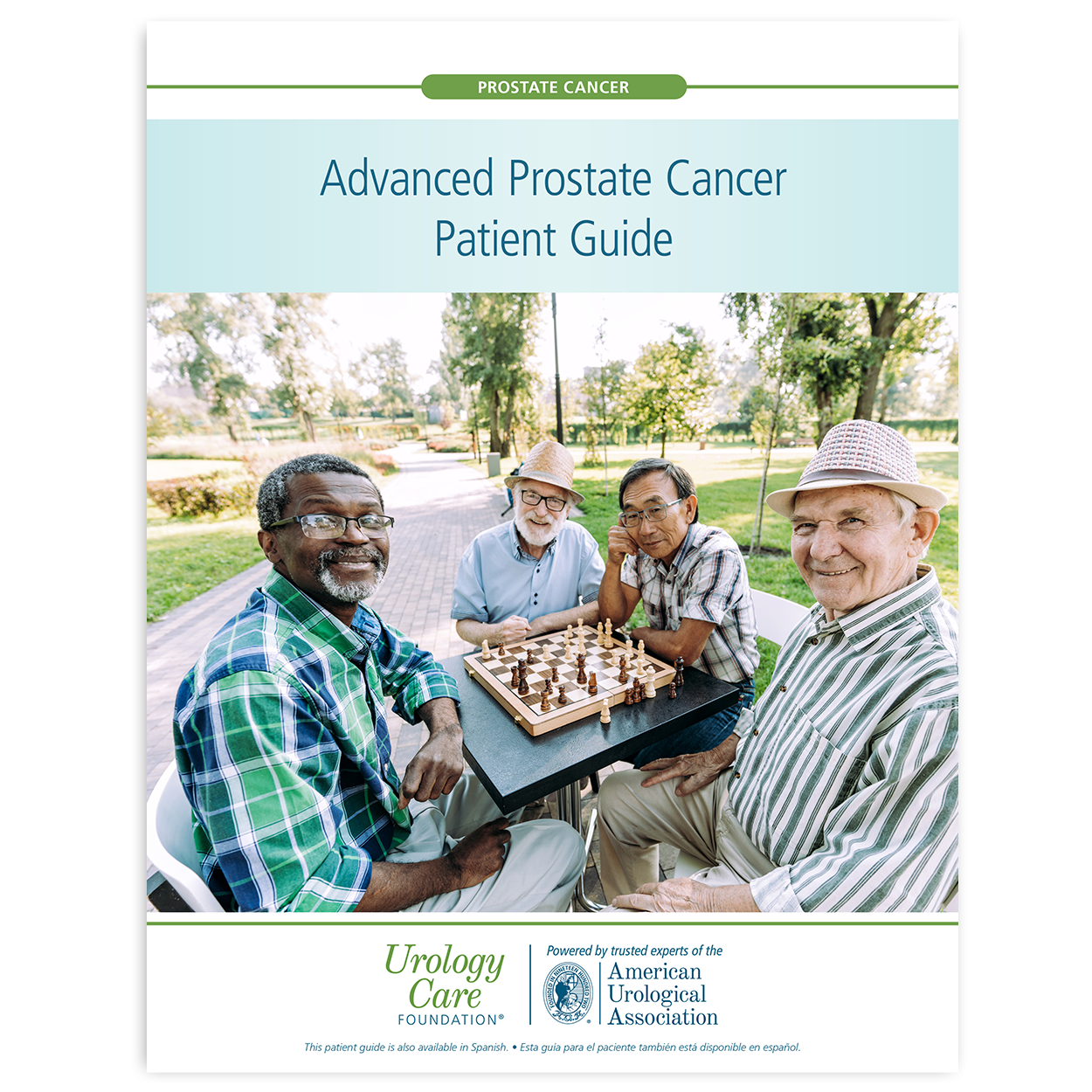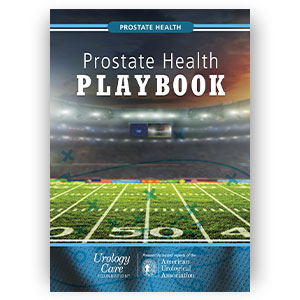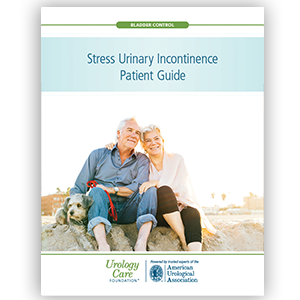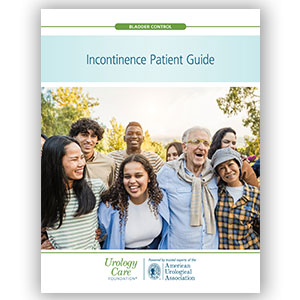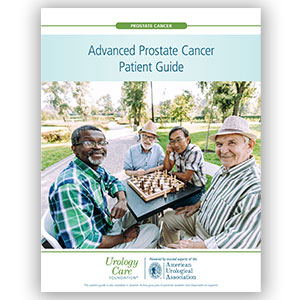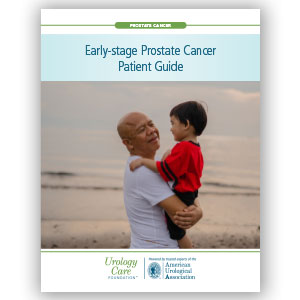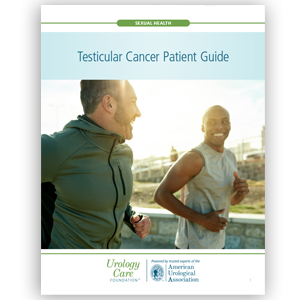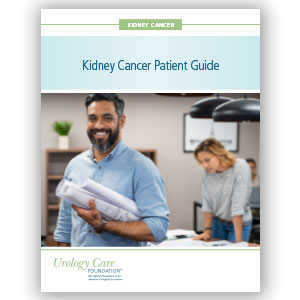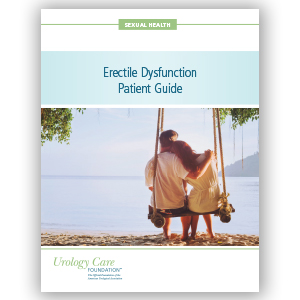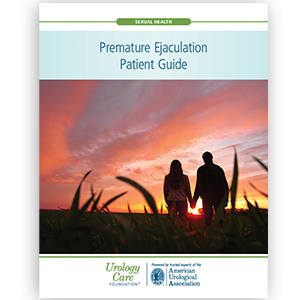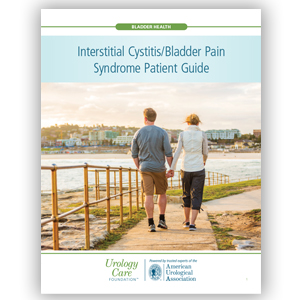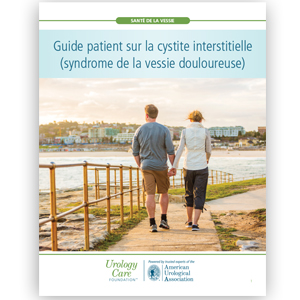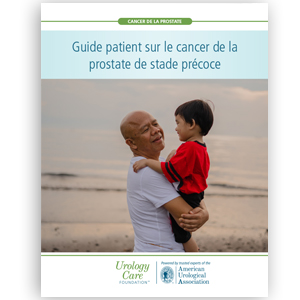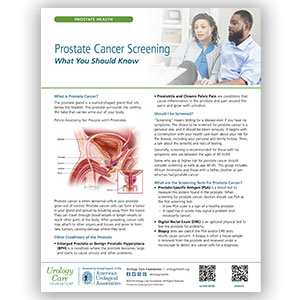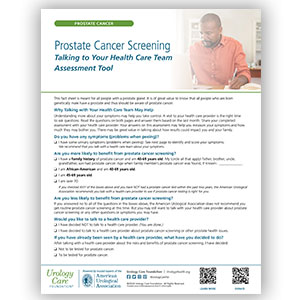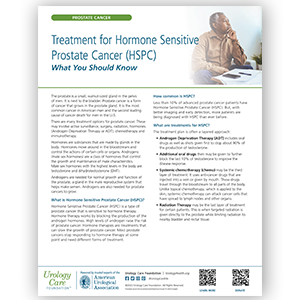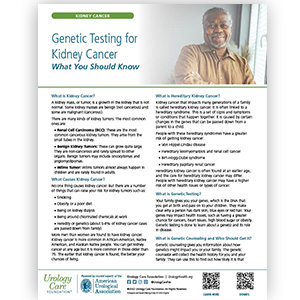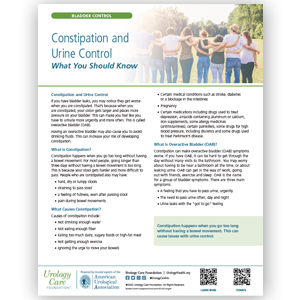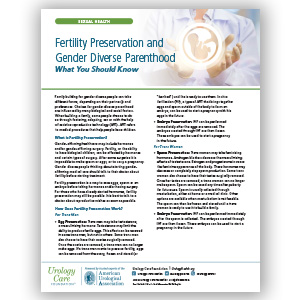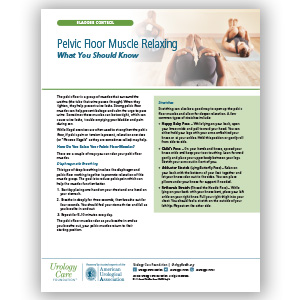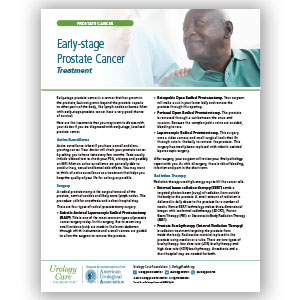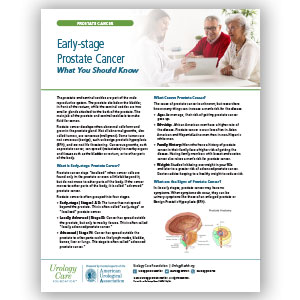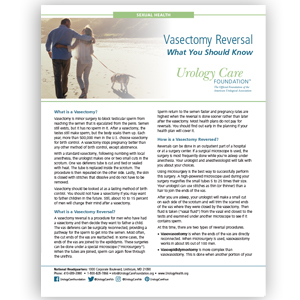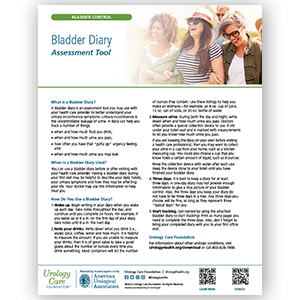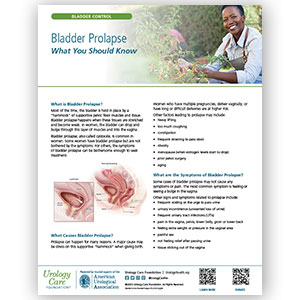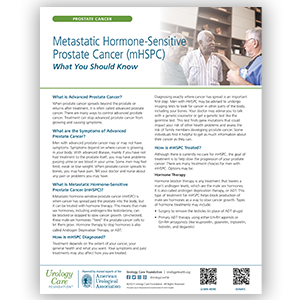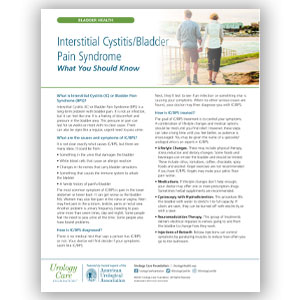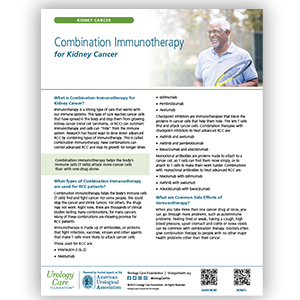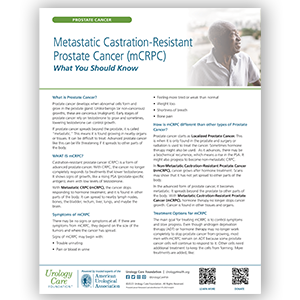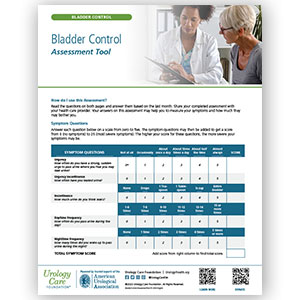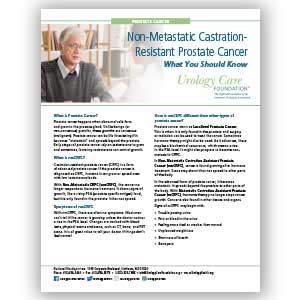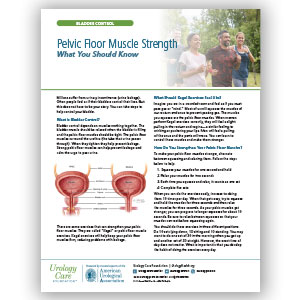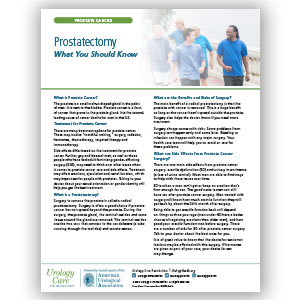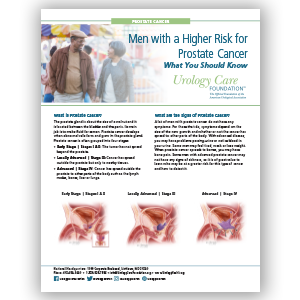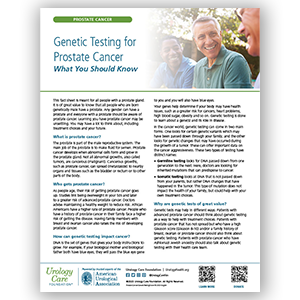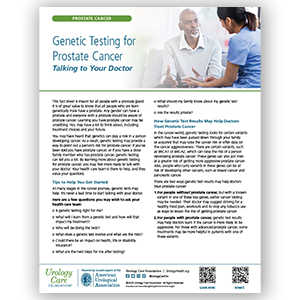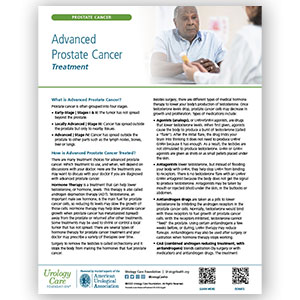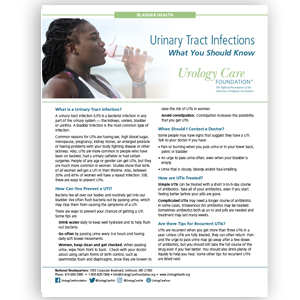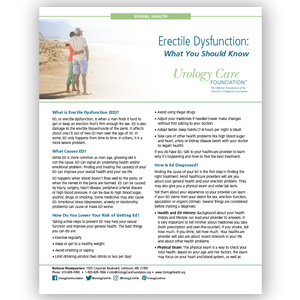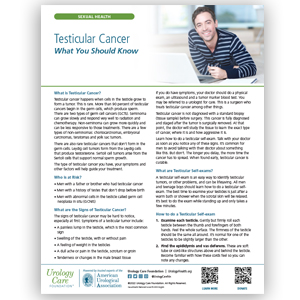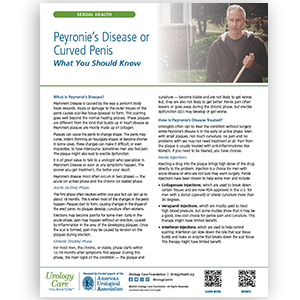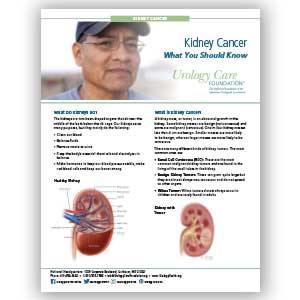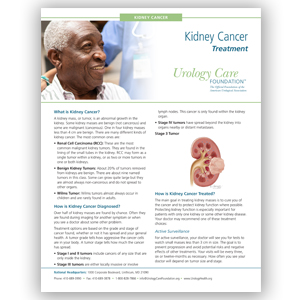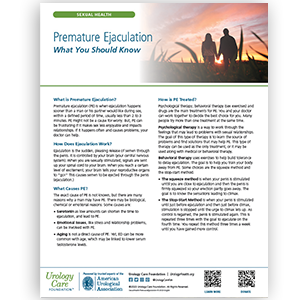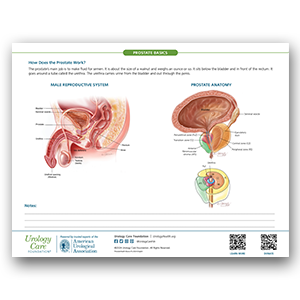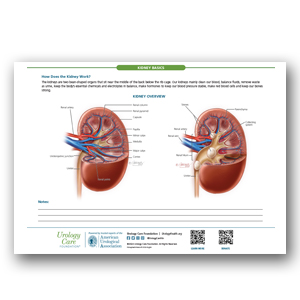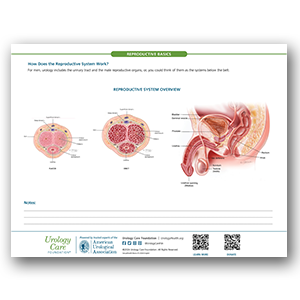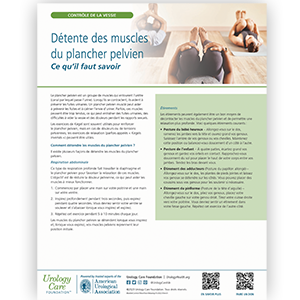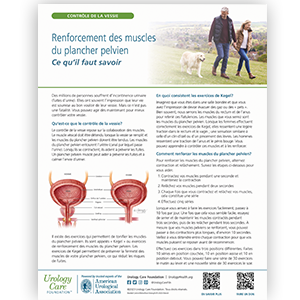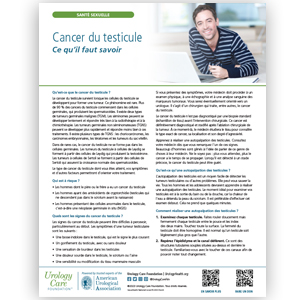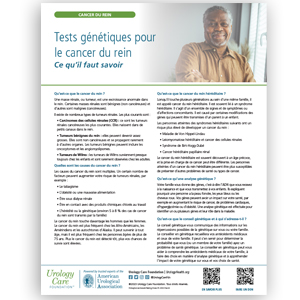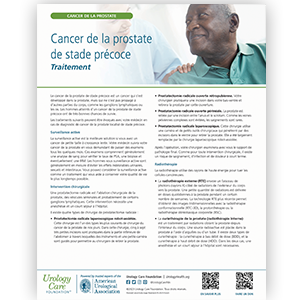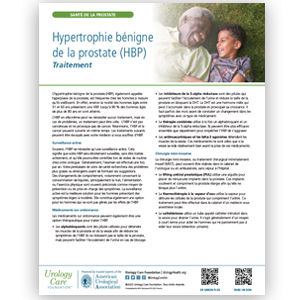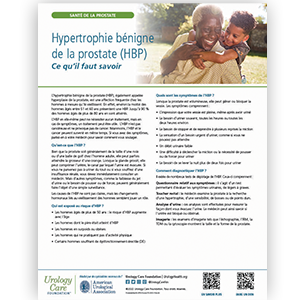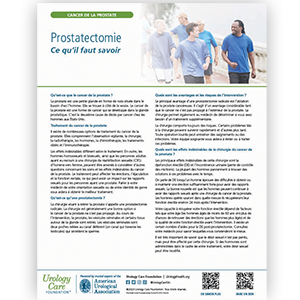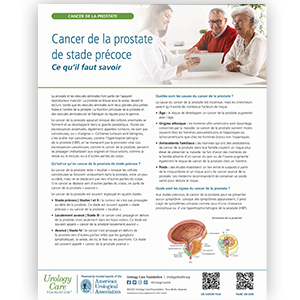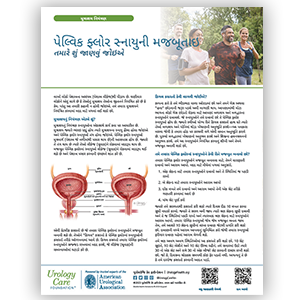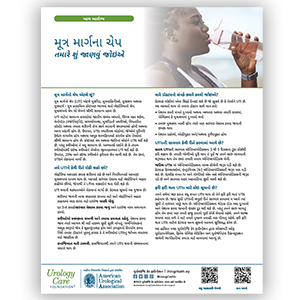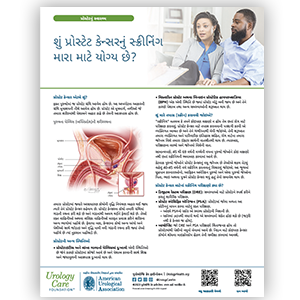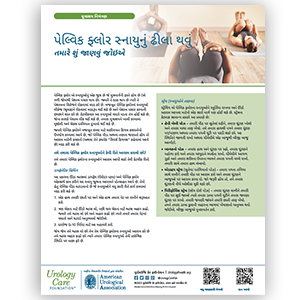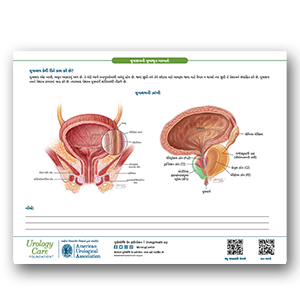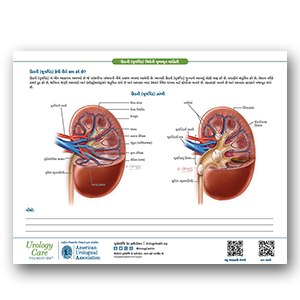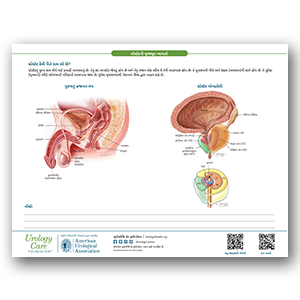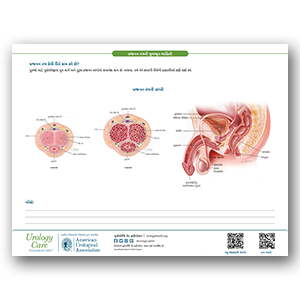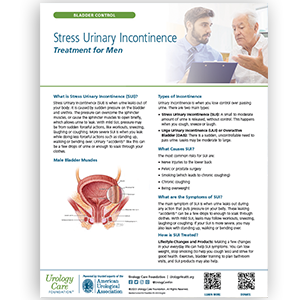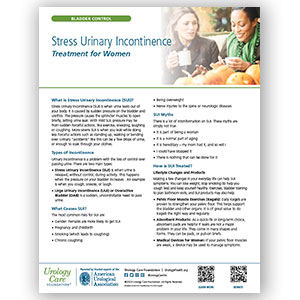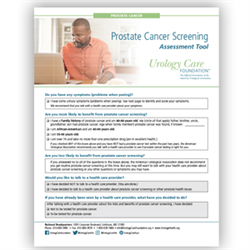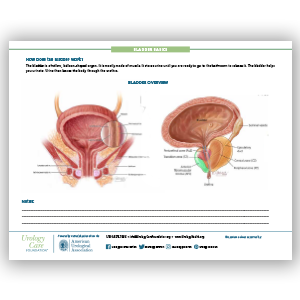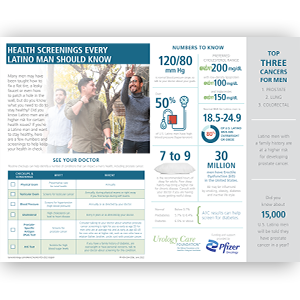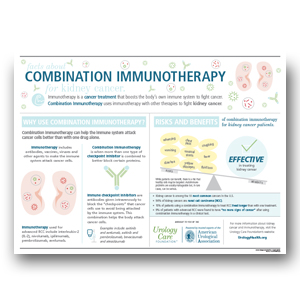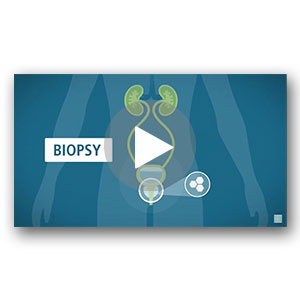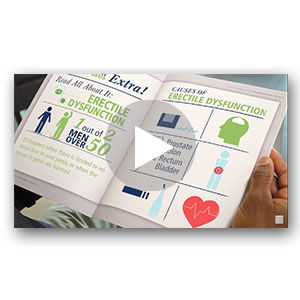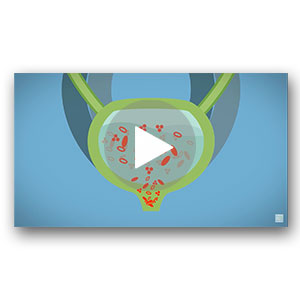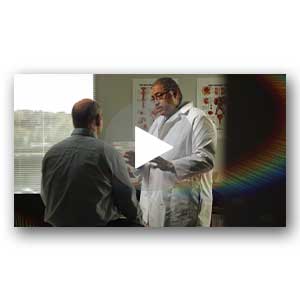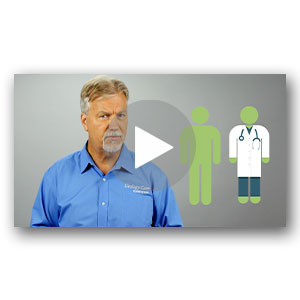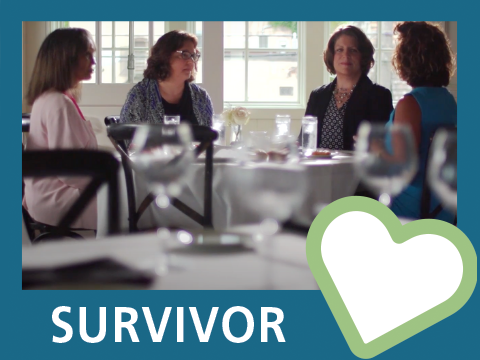Advanced Prostate Cancer
Order available (US ONLY). In this patient guide, patients are provided with information about advanced prostate cancer to help during their prostate cancer journey. Content includes how to diagnose, screen, treat and manage advanced prostate cancer, including a patient perspective.… more
Prostate Health Playbook
Order this football-themed prostate health resource covering prostatitis, BPH, incontinence as well as information on prostate cancer to include screening and treatment options.… more
Living Healthy Cookbook with Information about Urologic Cancers
Part of managing cancer includes a healthy diet and lifestyle. This educational cookbook has recipes from celebrity chefs and is designed to help those affected by urologic cancers.… more
Living Healthy Cookbook with Information about Urologic Cancers
Part of managing cancer includes a healthy diet and lifestyle. This educational cookbook has recipes from celebrity chefs and is designed to help those affected by urologic cancers.… more
Stress Urinary Incontinence (SUI)
Download this patient resource on Stress Urinary Incontinence (SUI).… more
Early-stage Prostate Cancer
How to diagnose, screen, treat and manage early-stage prostate cancer, including a patient perspective.… more
Testicular Cancer Patient Guide
Detailed guide to include a patient story, symptoms, diagnosis and treatment for men as well as a section on children with testicular cancer.… more
Interstitial Cystitis/Bladder Pain Syndrome (IC/BPS)
Download this patient guide to learn more information about IC/BPS and the urinary tract.… more
Guide patient sur la cystite interstitielle (syndrome de la vessie douloureuse)
La cystite interstitielle (CI), ou syndrome de la vessie douloureuse (SVD), est un problème de douleur vésicale chronique. Cela peut évoquer une infection de la vessie ou infection urinaire, mais ce n’en est pas une. Il s’agit d’une sensation d’inconfort et de pression dans la région de la vessie qui dure six semaines ou plus, sans infection ni autre cause évidente. (Patient Guide to Interstitial Cystitis (Painful Bladder Syndrome))… more
Guide patient sur le cancer de la prostate de stade précoce
Le cancer de la prostate est la deuxième cause de décès par cancer chez les hommes aux États-Unis. La plupart des hommes ayant un diagnostic précoce peuvent vivre longtemps. Choisir son traitement peut être difficile. Informez-vous et posez des questions afin de faire le choix qui vous conviendra le mieux. (Early-stage Prostate Cancer Patient Guide)… more
શિશ્નોત્્થથાન અપક્રિયા (ઇરેક્્ટટા ઇલ ડિસફંકશન) અંગે દર્ દીની માર્ ્ગદર્્શ ન
અભ્્યયાસ દર્્શશાવે છે કે 50 વર્્ષથી વધુ ઉંમરના2માંથી 1 પુરુષમાં અમુક અંશે શિશ્નોત્્થથાન અપક્રિયા(ઇરેક્્ટટાઇલ ડિસફંકશન) (ED) હોય છે.વૃદ્ધાવસ્્થથા જ એકમાત્રકારણનથી પરંતુ પુરુષોની ઉંમર સાથે ED વધુ સામાન્્યબને છે. (Erectile Dysfunction Patient Guide)… more
આજે અતિસક્રિય મૂત્રાશય વિશે વાત કરવા નો સમય છે
યુનાઇટેડસ્્ટટેટ્્સમાં લાખોલોકોમૂત્રાશયની સમસ્્યયાઓનોસમૂહએવા અતિસક્રિય મૂત્રાશય (OAB) સાથે સંઘર્્ષકરી રહ્યાછે. OABમાં તમારુુંમૂત્રાશય ખરેખર ભરાયેલું ન હોય ત્્યયારે પણતમારા મૂત્રાશયને પેશાબ કરવાની તીવ્ર ઇચ્્છછાથાય છે. કેટલીકવાર એવું બને છે કે તમારુુંમૂત્રાશય અતિશય સંવેદનશીલબની જાય છે અને કેટલીકવાર એવું પણબને છે કે તમે તેને પરવાનગી ન આપોતોપણતે પેશાબ કરવાની છૂટઆપી દે છે. (Overactive Bladder Patient Guide)… more
ઇન્્ટર્્સ્ટટિશલ સિસ્્ટટીટીસ /બ્્લલૅડર પેઇન સિન્ડ્રોમ દર્દી માર્્ગદર્્શશિ કા
ઘણા લોકોને ઇન્્ટર્્સ્ટટિશિયલ સિસ્્ટટીટીસ(IC) અથવા બ્્લલૅડર પેઇન સિન્ડ્રોમ (BPS) - મૂત્રાશયમાં દુખાવોઅને પેશાબની તાકીદ અને આવર્્તન સહિતના લક્ષણોનું તબીબી નામ - તેનું નિદાન કરવામાં મહિનાઓ કે વર્ષો પણલાગે છે.સારા થવાનું પ્રથમ પગલું એ છે કે તમે બની શકે તેટલું વધુ શીખો.તમારા લક્ષણોને સમજોઅને વિવિધ સારવાર વિકલ્્પપોવિશે જાણો. (IC/BPS Patient Guide)… more
મૂત્રાશયના કૅન્્સરનાં દર્ દી માટેની માર્્ગદર્્શ શિકા
મૂત્રાશયનું કૅન્્સર ઘણીવાર મૂત્રાશયનાઅસ્્તરમાં શરૂ થાય છે.મોટાભાગનાકૅન્્સરની જેમ, મૂત્રાશયનાકૅન્્સરનું વહેલું નિદાન કરાવવાથી તમને વધુ સારવારનાવિકલ્્પપોઅને સારાપરિણામો મળી શકે છે. (Bladder Cancer Patient Guide)… more
પ્રોસ્્ટટૅટ કૅન્્સરનો પ્્રાાંરભિક તબક્કો દર્ દી માટ ેની માર્્ગદર્્શશિકા
પ્રોસ્્ટટૅટકૅન્્સર U.S.માંપુરૂષોમાટે કૅન્્સરથી થતામૃત્્યયુનુંબીજું અગ્રણી કારણગણાય છે, મોટાભાગનાપુરૂષોજેઓને વહેલી ખબર પડે છે તેઓ લાંબુ જીવન જીવી શકે છે. (Early-stage Prostate Cancer Patient Guide)… more
ટેસ્્ટટિક્યુલર કૅન્્સરના દર્દીની માર્્ગદર્્શશિકા
ટેસ્્ટટિક્યુલર કૅન્્સર છોકરા અથવા પુરુષને કોઈપણઉંમરે થઈ શકે છે (નવજાતથી લઈને વૃદ્ધ સુધી), તે મોટાભાગે 15 થી 44 વર્્ષની વયના પુરુષોમાં જોવા મળે છે.વૃષણમાં કૅન્્સર વધ્્યયુુંછે તે જાણીને હંમેશા આઘાત લાગે છે, ખાસકરીને નાની ઉંમરે.જોકે, વહેલાંસર નિદાન વડે આ કૅન્્સરની સારવાર કરી શકાય છે અને સારુુંપણકરી શકાય છે.રાહન જોવી મહત્તત્વપૂર્્ણછે. (Testicular Cancer Patient Guide)… more
મૂત્રપિંડ કૅન્્સરનાં દર્ દીઓ માટેની માર્્ગદર્્શશિકા
તમારા ડૉકટરે હમણાં જતમને સમાચાર આપ્્યયાાંછે કે તમારા મૂત્રપિંડમાં વૃદ્ધિ થઈ છે.તે શું છે અને એનો તમારા માટે શું અર્્થથાય છે? આપણાં મૂત્રપિંડનું મુખ્્યકાર્્યઆપણા લોહીને ફિલ્્ટર (શુદ્ધકરવાનું) છે.કેટલીક વખત આપણાં મૂત્રપિંડની અંદર આપણને માસ(વૃદ્ધિ અથવા ટ્યૂમર) થયેલો જોવા મળે છે. (Kidney Cancer Patient Guide)… more
બિનાઇન પ્રોસ્્ટટૅટિક હાયપરપ્્લલા ઝિયા (BPH) દર્ દી માર્્ગદર્્શશિકા
જોતમારુુંબિનાઇન પ્રોસ્્ટટૅટિક હાયપરપ્્લલાઝિયા (BPH)નું નિદાન થયું હોય, જે વિસ્્તતારિત પ્રોસ્્ટટૅટતરીકે વધુ જાણીતું છે, તોતમે એવા એકલા વ્્યક્્તતિનથી જેનું નિદાન થયું હોય.પુરુષોમાં તેઓની વયને કારણે થતી આ સામાન્્યસ્્થથિતિછે.વાસ્્તવમાં, 51 અને 60 વ ર્્ષની વચ્્ચચેની વયના લગભગઅડધા પુરુષોBPH ધરાવે છે.80 વર્્ષથી વધુ વયના 90 ટકા પુરુષોતે ધરાવે છે. (BPH Patient Guide)… more
અસંયમ (ઇનકોન્્ટટિનન્્સ્ટસ) માટે દર્ દીની માર્્ગદર્્શશિકા
યુનાઇટેડ સ્્ટટેટ્્સમાં લાખો લોકો અસંયમ અને મૂત્રાશય નિયંત્રણના લક્ષણો સાથે જીવે છે.તે પુરુષો, સ્ત્રીઓ અને બાળકોને તેઓ ઈચ્્છછેતેવું જીવન જીવતા અટકાવે છે.બાથરૂમથી દૂર રહેવાનો ભય કાર્્યઅને અન્્યઘણી બાબતો કરવા વિશેની પસંદગીઓને મર્્યયાદિત કરી શકે છે. (Incontinence Patient Guide)… more
એડવાન્્સ્્ડ પ્રોસ્ ્ટટૅટ કૅન્્સરદર્ દી માર્્ગદર્્શન
પ્રોસ્્ટટૅટકૅન્્સર એ યુનાઇટેડ સ્્ટટેટ્્સમાં પુરુષોમાં બીજું સૌથી સામાન્્યકૅન્્સર છે. નવમાંથી એક પુરૂષને તેમના જીવનકાળ દરમિયાન પ્રોસ્્ટટૅટકૅન્્સર હોવાનું નિદાન થાય છે. વૃદ્ધપુરુષોઅને આફ્રિકન અમેરિકન પુરુષોમાં પ્રોસ્્ટટૅટકૅન્્સર થવાની શક્યતા વધુ હોય છે. (Advanced Prostate Cancer Patient Guide)… more
UrologyHealth extra® – Bladder Cancer Special Issue
Order this special issue focusing on bladder cancer to be shipped free in the United States and includes information for patients and caregivers on the basics such as the stages of this cancer, symptoms, treatments, risk factors and how to learn more.… more
UrologyHealth extra® – Bladder Cancer Special Issue
Download this special issue focusing on bladder cancer that includes information for patients and caregivers on the basics such as the stages of this cancer, symptoms, treatments, risk factors and how to learn more.… more
UrologyHealth extra® – Navigating Prostate Cancer
Download this special issue focusing on prostate cancer that includes information for patients and caregivers on risk factors, healthy living tips and more.… more
UrologyHealth extra – Navigating Prostate Cancer
Order this special issue focusing on prostate cancer that includes information for patients and caregivers on risk factors, healthy living tips and more.… more
Prostate Cancer Screening What You Should Know
Order this patient-friendly prostate cancer screening fact sheet to be shipped free in the United States. This fact sheet is used to aid in decision making about prostate cancer screening.… more
Prostate Cancer Screening Talking to Your Health Care Team Assessment Tool
Download this free patient-friendly screening assessment tool designed to self-assess symptoms to help guide conversations with your health care team about prostate cancer screening. … more
Prostate Cancer Screening What You Should Know
Download this free patient-friendly fact sheet to aid in decision making about prostate cancer screening.… more
Women’s Health and Menopause – What You Should Know Fact Sheet
Learn about women’s health during perimenopause and menopause, symptoms and treatment options. … more
Women’s Health and Menopause – What You Should Know Fact Sheet
Order this fact sheet that includes information on perimenopause, menopause, symptoms and treatment options for women.… more
Treatment Intensification for Hormone Sensitive Prostate Cancer (HSPC) - Talking to Your Doctor Fact Sheet
Learn about treatment intensification for Hormone Sensitive Prostate Cancer and questions to ask your doctor.… more
Treatment for Hormone Sensitive Prostate Cancer (HSPC) - What You Should Know Fact Sheet
Learn about Hormone Sensitive Prostate Cancer, common treatments and what to expect after treatment.… more
Genetic Testing for Kidney Cancer – What You Should Know Fact Sheet
A description about genetic testing for kidney cancer and how genetic test results may help patients make informed choices.… more
Constipation and Urine Control - What You Should Know Fact Sheet
This fact sheet outlines what to know about constipation and urine control. Constipation happens when you go too long without having a bowel movement & this can cause issues with urine control. … more
Constipation and Urine Control: What You Should Know
Order this fact sheet that outlines what to know about constipation and urine control. Constipation happens when you go too long without having a bowel movement & this can cause issues with urine control. … more
Androgen Deprivation Therapy (ADT) - Talking to Your Doctor Fact Sheet
Learn about how to talk to your doctor Androgen Deprivation Therapy (ADT) for prostate cancer.… more
Androgen Deprivation Therapy (ADT) – What You Should Know Fact Sheet
Learn about Androgen Deprivation Therapy (ADT) for prostate cancer, who should receive ADT, how is ADT given and the benefits, risks and side effects of ADT. … more
Topical Estrogen – What You Should Know Fact Sheet
Women who have gone through menopause often have vaginal dryness. This problem is also common in those who have had both of their ovaries surgically removed. In some cases, vaginal dryness can lead to pain with sex, burning vaginal discomfort or itching, recurrent urinary tract infections (UTIs) or abnormal vaginal discharge. Topical estrogen is a prescription treatment that can help lower or ease these symptoms.… more
Adult Gender: What You Should Know
Learn about adult gender, gender affirmation and terms around gender.… more
Fertility Preservation and Gender Diverse Parenthood: What You Should Know
Learn about fertility preservation for gender diverse adults and frequently asked questions.… more
Adult Sexuality and Gender Diversity: What You Should Know
Learn about adult sexuality and gender diversity, sexual orientation, gender dysphoria and medical choices for gender diverse adults.… more
Adult Masculinizing Gender-Affirming Surgery: What You Should Know
Learn about gender affirmation, adult masculinizing gender-affirming surgery and questions to ask your doctor.… more
Adult Feminizing Gender-Affirming Surgery: What You Should Know
Learn about gender affirmation, adult feminizing gender-affirming surgery and questions to ask your doctor.… more
Bladder Cancer: What You Should Know
Learn more about the basics of bladder cancer including types, causes, symptoms, testing and treatment options. … more
Salvage Radiation Therapy for Prostate Cancer
Learn about salvage radiation therapy (SRT) as a type of cancer treatment given to men who had their prostate removed yet their prostate-specific antigen (PSA) levels begin to rise.… more
Genomic Diagnostic Testing for Prostate Cancer
Learn about genomic testing and how it may impact prostate cancer.… more
Pelvic Floor Muscle Relaxing: What You Should Know
Strong pelvic floor muscles can help prevent leakage and calm the urge to pass urine. Sometimes these muscles can be too tight, which can cause urine leaks, trouble emptying your bladder and pain during sex.… more
Advanced Prostate Cancer – What You Should Know
A review of advanced prostate cancer to include its stages and risk factors.… more
Treatment for Early-Stage Prostate Cancer
This fact sheet covers the treatments you may want to discuss with your doctor if you are diagnosed with early-stage, localized prostate cancer.… more
Early-Stage Prostate Cancer: What You Should Know
Learn more about Early-Stage Prostate Cancer using this fact sheet.… more
Vasectomy Reversal
Download this fact sheet with information about vasectomy reversal. Vasectomy reversal is a procedure for men who have had a vasectomy and then decide they want to father a child.… more
Bladder Diary Assessment Tool
Use this bladder diary assessment tool and share the results with your healthcare provider to get a better understanding of your urinary incontinence symptoms. … more
Bladder Diary Assessment Tool
Use this bladder diary assessment tool and share the results with your healthcare provider to get a better understanding of your urinary incontinence symptoms. … more
Bladder Prolapse - What You Should Know
An overview of bladder prolapse causes, symptoms, diagnosis and treatment options.… more
Metastatic Hormone-Sensitive Prostate Cancer (mHSPC) - What You Should Know Fact Sheet
A concise summary about Metastatic Hormone-Sensitive Prostate Cancer to help patients understand this stage, to include treatment.… more
Interstitial Cystitis/Bladder Pain Syndrome (IC/BPS) Fact Sheet
Download this fact sheet to read a concise review of interstitial cystitis/bladder pain syndrome.… more
Combination Immunotherapy for Kidney Cancer Fact Sheet
Summary of combination immunotherapy for renal cell carcinoma including treatment, adverse reactions and questions to ask the health care team.… more
Varicoceles - What You Should Know
Designed for teen boys and men to explain this condition, causes, treatments and address frequently asked questions.… more
Metastatic Castration-Resistant Prostate Cancer (mCRPC) - What You Should Know Fact Sheet
A concise summary of Metastatic Castration –Resistant Prostate Cancer to help patients understand this stage of prostate cancer.… more
Bladder Control Assessment Tool
This Bladder Control assessment tool may help to measure symptoms and quality of life related to passing urine.… more
Non-Metastatic Castration-Resistant Prostate Cancer (nmCRPC) – What You Should Know
A concise summary of Non-metastatic Castration–Resistant Prostate Cancer to help patients understand this stage of prostate cancer.… more
Pelvic Floor Muscle Strength: What You Should Know
Download this fact sheet on how to perform Kegel exercises.… more
Overactive Bladder Assessment Tool
An assessment tool that allows patient to score symptoms and illustrates how they may be affecting their quality of life.… more
Overactive Bladder Diary
This Overactive Bladder Diary may help to record liquid intake, how often urine is passed and urine leakage to help you talk with your health care team.… more
Bladder Control Assessment Tool
This Bladder Control assessment tool may help to measure symptoms and quality of life related to passing urine. … more
Prostatectomy – What You Should Know Fact Sheet
A review of prostatectomy for prostate cancer treatment to include general information, benefits, risks and side effects. … more
Men with a Higher Risk for Prostate Cancer – What You Should Know
Learn about which men may have a higher risk for prostate cancer as well as about screening and treatment. … more
Genetic Testing for Prostate Cancer - What You Should Know
Learn about genetic testing and how it may impact prostate cancer.… more
Genetic Testing for Prostate Cancer – Talking to Your Doctor
At many stages in the cancer journey, genetic tests may help. This fact sheet may help prepare those impacted by prostate cancer to talk to the health care team.… more
Advanced Prostate Cancer Treatment
A review of advanced prostate cancer to include its stages and treatment options.… more
Neurogenic Bladder - What You Should Know Fact Sheet
A fact sheet that helps patients to understand when nerve damage causes bladder problems and how to manage the condition.… more
Urinary Tract Infections What You Should Know
A description of urinary tract infections to include tips on how to prevent UTIs.… more
Prostate Basics
The basics about prostate function and prostate cancer with notes section to help patients and health care teams.… more
Kidney Basics
The basics about kidney function, kidney stones and kidney cancer with notes section to help patients and health care teams.… more
Reproductive Basics
The basics about reproductive function in men as well as penile and testicular cancer with notes section to help patients and health care teams. … more
OEstrogènes topiques: Ce qu’il faut savoir
Les femmes ménopausées présentent souvent une sécheresse vaginale. Ce problème est également fréquent chez celles qui ont subi une ablation chirurgicale des deux ovaires. Dans certains cas, la sécheresse vaginale peut entraîner des douleurs lors des rapports sexuels, une sensation de brûlure ou des démangeaisons vaginales, des infections urinaires (IU) récurrentes ou des pertes vaginales anormales. (Topical Estrogen – What You Should Know Fact Sheet)… more
Détente des muscles du plancher pelvien: Ce qu’il faut savoir
Un plancher pelvien musclé peut aider à prévenir les fuites et à calmer l’envie d’uriner. Parfois, ces muscles peuvent être trop tendus, ce qui peut entraîner des fuites urinaires, des difficultés à vider la vessie et des douleurs pendant les rapports sexuels. (Pelvic Floor Muscle Relaxing – What You Should Know Fact Sheet)… more
Renforcement des muscles du plancher pelvien: Ce qu’il faut savoir
Des millions de personnes souffrent d’incontinence urinaire (fuites d’urine). Elles ont souvent l’impression que leur vie est soumise au bon vouloir de leur vessie. Mais ce n’est pas une fatalité. Vous pouvez agir dès maintenant pour mieux contrôler votre vessie. (Pelvic Floor Muscle Strength – What You Should Know Fact Sheet)… more
Cancer du testicule: Ce qu’il faut savoir
Le cancer du testicule survient lorsque les cellules du testicule se développent pour former une tumeur. Ce phénomène est rare. Plus de 90 % des cancers du testicule commencent dans les cellules germinales, qui produisent les spermatozoïdes. (Testicular Cancer – What You Should Know Fact Sheet)… more
Tests génétiques pour le cancer du rein: Ce qu’il faut savoir
Une masse rénale, ou tumeur, est une excroissance anormale dans le rein. Certaines masses rénales sont bénignes (non cancéreuses) et d’autres sont malignes (cancéreuses). (Genetic Testing for Kidney Cancer - What You Should Know Fact Sheet)… more
Kystes rénaux: Ce qu’il faut savoir
Avec l’âge, des poches remplies de liquide, appelées kystes, peuvent se former dans les reins. Il existe cinq catégories de kystes rénaux. La plupart sont de classe I (kystes simples) et de classe II (kystes peu complexes). Ces types de kystes sont presque toujours non cancéreux. Les kystes complexes peuvent être associés à un cancer et devront être suivis ou traités. (Kidney Cysts – What You Should Know Fact Sheet)… more
Cancer de la prostate de stade précoce: Traitement
Les traitements suivants peuvent être évoqués avec votre médecin en cas de diagnostic de cancer de la prostate localisé de stade précoce. (Early-stage Prostate Cancer Treatment Fact Sheet)… more
Hypertrophie bénigne de la prostate (HBP): Traitement
L’HBP en elle-même peut ne nécessiter aucun traitement, mais en cas de problèmes, un traitement peut être utile. L’HBP n’est pas cancéreuse et ne provoque pas de cancer. Néanmoins, l’HBP et le cancer peuvent survenir en même temps. Les traitements suivants peuvent être évoqués avec votre médecin si vous souffrez d’HBP. (BPH Treatment Fact Sheet)… more
Hypertrophie bénigne de la prostate (HBP): Ce qu’il faut savoir
L’hypertrophie bénigne de la prostate (HBP), également appelée hyperplasie de la prostate, est une affection fréquente chez les hommes à mesure qu’ils vieillissent. (BPH - What You Should Know Fact Sheet)… more
Prostatectomie: Ce qu’il faut savoir
La chirurgie visant à retirer la prostate s’appelle une prostatectomie radicale. La chirurgie est généralement une bonne option si le cancer de la prostate ne s’est pas propagé. (Prostatectomy - What You Should Know Fact Sheet)… more
Cancer de la prostate de stade précoce: Ce qu’il faut savoir
Le cancer de la prostate apparait lorsque des cellules anormales se forment et se développent dans la glande prostatique. Toutes les excroissances anormales, également appelées tumeurs, ne sont pas cancéreuses, ou « malignes ». Certaines tumeurs sont bénignes, c’est-à-dire non cancéreuses, comme l’hypertrophie bénigne de la prostate (HBP), et ne menacent pas le pronostic vital. (Early-stage Prostate Cancer - What You Should Know Fact Sheet)… more
પેલ્્વવિક ફ્્લલો ર સ્્નના યુની મજબૂતાઇ તમારે શું જાણવું જોઇએ
લાખો લોકો પેશાબના અસંયમ (પેશાબ લીકેજ)થી પીડાય છે. ઘણીવાર લોકોને એવું લાગે છે કે તેઓનું મૂત્રાશય તેઓના જીવનને નિયંત્રિત કરે છે કે કેમ. પરંતુ આ તમારી કહાની ન હોવી જોઇએ. તમે તમારા મૂત્રાશયને નિયંત્રિત કરવામાં મદદ માટે પગલાં લઈ શકો છો. (Pelvic Floor Strengthening – What You Should Know Fact Sheet)… more
મૂત્ર માર્્ગના ચેપ તમારે શું જાણવું જોઇએ
મૂત્ર માર્્ગનો ચેપ (UTI) એટલે મૂત્રપિંડ, મૂત્રવાહિનીઓ, મૂત્રાશય અથવા મૂત્રમાર્્ગ - મૂત્ર પ્રણાલિના કોઇપણ ભાગમાં થતો બૅક્્ટટેરિયાનો ચેપ. મૂત્રાશયનો ચેપ એ ચેપનો સૌથી સામાન્્યપ્રકારછે. (Urinary Tract Infections – What You Should Know Fact Sheet)… more
શું પ્રોસ્્ટટેટ કેન્્સરનું સ્ક્રીનિંગ મારા માટે યોગ્્ય છે?
"સ્ક્રીનિંગ" મતલબ કેતમનેકોઇપણ લક્ષણો ન હોય તેમ છતાં રોગમાટેપરીક્ષણ કરાવવું. પ્રોસ્્ટટેટકેન્્સર માટેતપાસ કરાવવાની પસંદગી કરવી એ વ્્યક્્તતિગતબાબતછેઅનેતેનેગંભીરતાથી લેવી જોઇએ. (Is Prostate Cancer Screening Right for Me? Fact Sheet)… more
હિમેટુરિયા (પેશાબ વાટે લોહી પડવું) તમારે શું જાણવું જોઇએ
હિમેટુરિયા એટલે પેશાબમાં લોહી આવવું. જ્્યયારે પેશાબ લાલ અથવા ગુલાબી રંગનો દેખાય ત્્યયારે તે પેશાબમાં લોહી આવવા સાથે સંકળાયેલ હોઈ શકે છે અને તેને "ગ્રોસ" અથવા "દૃશ્્યમાન" હિમેટુરિયા કહેવામાં આવે છે. કેટલીક વખત, પેશાબમાં લોહી હોય છે પરંતુ તે સહેલાઇથી દેખાતું નથી અને તેને "માઇક્રોસ્્કકોપિક” હિમેટુરિયા કહેવામાં આવે છે કારણ કે તે ફક્્તમાઇક્રોસ્્કકોપ હેઠળ જ દેખાઇ શકે છે. (Hematuria – What You Should Know Fact Sheet)… more
પેલ્્વવિક ફ્્લલોર સ્્નનાયુનું ઢીલા થવું તમારે શું જાણવું જોઇએ
પેલ્્વવિક ફ્્લલોર એ સ્્નનાયુઓનું એક જૂથ છે જે મૂત્રમાર્્ગની ફરતે હોય છે (એ નળી જેમાંથી પેશાબ પસાર થાય છે). જ્્યયારે તે કડક થાય છે ત્્યયારે તે પેશાબનાલિકેજને રોકવામાં મદદ કરે છે. મજબૂત પેલ્્વવિક ફ્્લલોરનાં સ્્નનાયુઓ લીકેજ (ચૂવાક)ને રોકવામાં મદદરૂપ થઈ શકે છે અને પેશાબ પસાર કરવાની ઇચ્્છછાને શાંત કરે છે. (Pelvic Floor Relaxing – What You Should Know Fact Sheet)… more
મૂત્રાશયની મૂળભૂત બાબતો
મૂત્રાશય એક ખાલી, બલૂન આકારનું અંગ છે. તે મોટે ભાગે સ્્નનાયુઓમાંથી બનેલું હોય છે. જ્્યયાાંસુધી તમે તેને છોડવામાટે બાથરૂમ જવામાટે તૈયાર ન થાઓ ત્્યયાાંસુધી તે પેશાબને સંગ્રહિત કરે છે. મૂત્રાશય તમને પેશાબ કરવામાં મદદ કરે છે. ત્્યયારબાદ પેશાબ મૂત્રમાર્ગે શરીરમાંથી નીકળે છે. (Bladder Health Basics Fact Sheet)… more
કિડની (મૂત્રપિંડ) વિશેની મૂળભૂત માહિતી
કિડની (મૂત્રપિંડ) બે બીન આકારના અવયવો છે જે પાંસળીના પાંજરાની નીચે પાછળ મધ્્યમાં આવેલી છે. આપણી કિડની (મૂત્રપિંડ) મુખ્્યત્્વવેઆપણુુંલોહી સાફ કરે છે, પ્રવાહીને સંતુલિત કરે છે, પેશાબ તરીકે કચરો દૂર કરે છે, શરીરના જરૂરી રસાયણો અને ઇલેક્ટ્રોલાઇટ્્સને સંતુલિત રાખે છે અને આપણા બ્્લડ પ્રેશરને સ્્થથિર રાખવા માટે હોર્મોન્્સબનાવે છે, રક્્તકણો બનાવે છે અને આપણા હાડકાંને મજબૂત રાખે છે. (Kidney Health Basics Fact Sheet)… more
પ્રો સ્્ટટૅટન ી મૂળભૂત બાબતો
પ્રોસ્્ટટૅટનું મુખ્્ય કામ વીર્્ય માટે પ્રવાહી બનાવવાનું છે. તેનું કદ અખરોટજેવડું હોયછે અને તેનું વજન એક ઔંસ કે તેની આસપાસ હોયછે. તે મૂત્રાશયની નીચે અને રેક્્ટમ (મળાશય)ની સામે હોયછે. (Prostate Basics Fact Sheet)… more
પ્રજનન તંત્રની મૂળભૂત માહિતી
પુરુષો માટે, યુરોલૉજીમાં મૂત્ર માર્્ગ અને પુરૂષ પ્રજનન અંગોનો સમાવેશ થાય છે, અથવા, તમે તેને કમરની નીચેની પ્રણાલીઓ કહી શકો છો. (Reproductive Basics Fact Sheet)… more
પ્રોસ્્ટટૅટેક્્ટટોમિ તમારે શું જાણવું જોઇએ
પ્રોસ્્ટટૅટને દૂર કરવાની શસ્ત્રક્રિયાને સંપૂર્્ણપ્રોસ્્ટટૅટેક્્ટટોમિકહેવામાં આવે છે. જોપ્રોસ્્ટટૅટકૅન્્સર પ્રોસ્્ટટૅટની બહાર ફેલાતું ન હોય તોશસ્ત્રક્રિયા મોટેભાગે સારોવિકલ્્પછે. શસ્ત્રક્રિયા દરમિયાન, પ્રોસ્્ટટૅટગ્રંથિ, સેમિનલ વેસિકલ્્સઅને ગ્રંથિની આસપાસના કેટલાક ટિશ્્યયૂદૂર કરવામાં આવે છે. (Prostatectomy – What You Should Know Fact Sheet)… more
Prostate Cancer Screening Assessment Tool
Order this patient-friendly screening assessment tool to be shipped free in the United States; designed to self-assess symptoms to help guide conversations with your health care team about prostate cancer screening. … more
Bladder Basics
The basics about bladder function and bladder cancer with notes section to help patients and health care teams. … more
Health Screenings Every Latino Man Should Know Poster
Did you know Latino men are at higher risk for many health issues? This free download includes numbers and screenings to help Latino men keep their health in check.… more
Combination Immunotherapy for Kidney Cancer
A graphic description of combination immunotherapy for renal cell carcinoma to include risks and benefits.… more
Bladder Cancer: Get the Facts
Did you know bladder cancer is the 10th most common cancer in the world? This patient education video from the Urology Care Foundation will tell you all of the facts you need about bladder cancer. … more
Genetic Testing for Prostate Cancer
In this patient education video from the Urology Care Foundation, we discuss the basics of genetic testing for prostate cancer.… more
Survivors: Patients & Caregivers Talk About Prostate Cancer
Survivors as patients and caregivers talk about their journey and how education can help take away from the fears that come with cancer.… more


